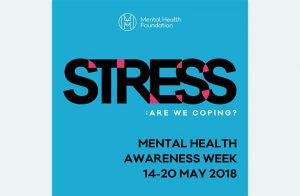Mitigating Stress | Sam Pont, Strength & Conditioning Coach
 Continuing with the Mental Health Awareness Week campaign “Stress: are we coping? I would like to introduce Sam Pont and his article Mitigating Stress.
Continuing with the Mental Health Awareness Week campaign “Stress: are we coping? I would like to introduce Sam Pont and his article Mitigating Stress.
We frequently read that exercise can help with managing stress. Conversely, stress factors can sap our energy levels, lower our tolerance to life’s challenges and make us less active.
I’m delighted that Sam agreed to contribute to the series as it is important for me to include a physical component to managing stress and mental health.
Sam has been my PT since I moved to the south coast. His client base is primarily competing athletes so I consider myself a lucky mortal. Sam is an expert at reading physical and mental energy signals and adjusting training sessions to get the best out of his clients. He walks the talk.
Happy reading!
 About Sam
About Sam
A highly dedicated 1-1 strength conditioning and fitness coach who started out studying physiotherapy and soon discovered his true calling was personal training and strength coaching.
Sam’s athletic clients include ultra-marathon runners, BJJ (Brazilian jiu-jitsu) athletes, he has competed and won gold twice in BJJ competitions, he has written books, he broadcasts his own podcast channel, developed fitness apps and has recently started working in film.
Mitigating Stress
Stress – something that comes part and parcel with the game of life. It’s good and bad, depending on the circumstances and situations around which it arises. Too much can see us crash and burn, our productivity taking a plummet, our happiness falling by the wayside, both of which can cause us to turn to more detrimental means in the name of relief.
I mean, think about how many slices of carrot cake you scoffed down last time things at the office weren’t running so smoothly.
Know Your Levels
Though highly regarded as a de-stressor, exercise in itself can create stress, too. I know that when I’m helping an athlete prepare for their next competition, I have to pay special attention to the stress they’re under physically and mentally so as not to overdo it. Doing so would corrupt their nervous, muscular and emotional systems. From here, their performance drops – the last thing either of us wants.
Making sure my athlete isn’t under too much stress is important however there are methods I use to get an accurate picture of their overall stress levels. I merely monitor their morning resting heart rate and if it’s higher than a certain point, they’re under too much stress, thus requiring more recovery.
One’s HRV (heart rate variability) is also an accurate measurement of how much stress they’re under. Taking this measurement focuses on the space between each heartbeat, and if the beats are a bit too regular, the person in question’s under too much stress.
The body’s stress hormones – think cortisol and adrenaline – will cause an increase in HRV thus creating a far more regular uniform heartbeat. Those slight imperceptible deviations in beats are actually a good thing as it shows the body is relaxed and not under hormonal stress.
These tools are great for anyone looking to monitor their stress levels when it comes to their own training – all you have to do is find a baseline and assess as and when you deviate from it. In all honesty, it’s a great habit to form because regardless of how we feel, stress may be masking itself in a variety of ways, or festering under the surface waiting to strike.
The outcomes of both physical and mental stress are near enough the same, be it from exercise, the office, or how you’re managing to deal with making a family meal while your little one turns the front room into an exploded rubbish tip!
Reducing Stress in Athletes
It’s for this reason that managing all of these can be achieved through the same techniques I use with my athletes to help them reduce their stress levels…
These all work to keep them performing at their peak and constantly improving – why not give them a go yourself and see how you fare?
- Stress-monitoring – simply find an average morning pulse over a two-week period. Do this upon waking for a minute on an empty stomach – especially before stimulants such as coffee and some teas. Deviation of over 20% will mean your physiological stress is on the rise. On top of this, HRV works well, too – there’s more deviation but it can prove more accurate when it comes to charting your stress levels. If you own one, have a look around your smart watch and see if you can find a tracker.
- Sleep – sleep’s golden, simple as that. Without it, you’re not able to process everything that goes down on the daily and your performance drops significantly – the only thing to soar being your cortisol levels. This rise in cortisol wreaks havoc on the hormones, ramping up ghrelin (the hunger hormone) whilst decreasing leptin (the satisfied hormone). This makes you hungrier than usual, and who wants to eat anything healthy when they’re hungrier than usual?
- Have a cold one – no, not a pint, a bath. Personally, when one of my athlete’s stress levels are sky high, I’ll have them take a cold bath. This forces the nervous system back to a healthy baseline whilst increasing norepinephrine by 350%, give or take. This also helps serotonin levels increase later on in the day – you end up happier, basically. All you need is 5-10 minutes and you’re done.
- Meditate – a classic. Be that as it may, every classic’s earned that title for a reason. Meditation is one of, if not the, best way to deal with stress. It’s been proven in study after study after study that meditation can help reduce one’s cortisol levels and grant them a heightened sense of wellbeing. A simple meditation I’d recommend is to set a timer for five minutes, and from there just focus on the breath. The sensation of the ribs expanding as the lungs fill with air…the process of letting the air leave your body through contraction… Thoughts will come – this isn’t something to get annoyed about, mind. All you have to do is acknowledge their presence before gently willing your mind back to your breath; with time, you’ll soon master this! A wise man once said if you should meditate every day for 20 minutes; if you’re too busy to meditate then make this 40 minutes!
- Exercise – although exercise is a stressor it can also act as a great de-stressor too if the reasons for your stress come from daily life.
Simply by doing some really vigorous work in or outside the gym can be a welcome psychological break to help you boost happiness and productivity.
I’m sure most of you are aware of the fight or flight response. 1000’s of years ago this served a function – to run or to hide – or die. These physiological responses are still evident in modern man today, however in our day-to-day life we can neither run nor hide!
The stress hormones pump out with no physical response from us. This in turn causes stress to build up. A hard workout can help mitigate some of the stress caused by this daily flux of ancient hormones. Instead of running from the Mammoth though you’ll be swinging that heavy 20kg kettlebell!
Samuel Pont is a Strength Coach and Personal Trainer working in Brighton UK and also available for online coaching
Personal Fitness Trainer in Brighton
Related:
Mental Health Foundation: Mental Health Awareness Week
Taking the Lid off of Stress and Mental Health | Carole Spiers, Chair of The International Stress Management Association [UK]
The Key Characteristics of Resilience | Laurel Alexander, Wellness Professionals at Work
Is Stress Merely a Word? | Dean Dickinson, Registered Osteopath and Chartered Physiotherapist
Understanding Stress and How it Affects your Emotions | Mark Vahrmeyer, Registered Psychotherapist
Elite Sport and Mental Health | Ian Braid, MD, DOCIAsport



2 comments to “Mitigating Stress | Sam Pont, Strength & Conditioning Coach”